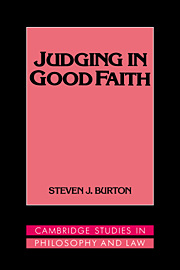1 - Stubborn indeterminacy
Published online by Cambridge University Press: 08 January 2010
Summary
THE DETERMINACY PROBLEM
The problem of legal indeterminacy has moved to the center of jurisprudential debate in the United States since Oliver Wendell Holmes, Jr., proclaimed:
The life of the law has not been logic: it has been experience. The felt necessities of the time, the prevalent moral and political theories, intuitions of public policy, avowed or unconscious, even the prejudices which judges share with their fellow-men, have had a good deal more to do than the syllogism in determining the rules by which men should be governed. The law embodies the story of a nation's development through many centuries, and it cannot be dealt with as if it contained only the axioms and corollaries of a book of mathematics.
Holmes's foil was Christopher Columbus Langdell, the famous father of legal education by Socratic dialogue. The lore is that Langdell supposed the law to be a consistent and complete body of dogmatic rules. For him, the law was objective in that it was rooted in timeless concepts each of which had an essential nature. It was neutral in that it stood apart from the contingent empirical context and might be invoked by persons with disparate opportunities to enjoy their legal rights or perform their legal duties. The law was determinate in that it dictated single right results in all possible cases. For convenience, this understanding of the law will be called “determinate-formalism.”
- Type
- Chapter
- Information
- Judging in Good Faith , pp. 3 - 34Publisher: Cambridge University PressPrint publication year: 1992



